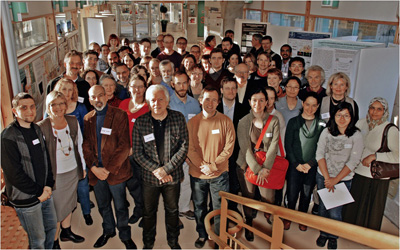Two faculty delegations visit Swedish universities to strengthen ties
By Krishna Ramanujan

Two delegations of Cornell faculty members traveled to Swedish universities this fall to plant seeds for future collaborations.
One group of nine Cornell faculty members from five departments participated in a Nov. 10-12 symposium at Stockholm University and laid the groundwork to collaborate with Swedish scientists on a broad range of topics related to insect science. Another group from the College of Agriculture and Life Sciences (CALS) strengthened their ties to faculty members at the Swedish University of Agricultural Sciences (SLU) in Uppsala, Sweden.
At the Stockholm symposium, each Cornell scientist paired up with one to two Stockholm University faculty members with similar research interests for discussions. Fifteen faculty and several students and postdoctoral researchers from Stockholm University participated.
Each scientist gave an informal lecture on their ongoing or future research projects, with the explicit aim of sharing work-in-progress as opposed to completed research.
Symposium topics ranged from basic ecology, plant-insect interactions and insect immunity to insect development, genomics and cell biology.
The Cornell researchers were: Brian Lazzaro and Jennifer Thaler (entomology); Andy Clark, John Lis and Mariana Wolfner (molecular biology and genetics); Anurag Agrawal (ecology and evolutionary biology); David Deitcher and Rob Raguso (neurobiology and behavior); and Yutaka Nibu (Weill Cornell Medical College).
The symposium's ultimate objectives were to build connections and explore the possibility of collaboration between scientists at the two universities.
At SLU, a delegation led by CALS Associate Dean Helene Dillard discussed with its Swedish counterparts expanding student exchange and faculty collaborations between the two schools. A delegation from SLU came to Ithaca in October to learn about Cornell research in biofuels and renewable energy.
SLU is a three-campus university that is considered a leader in the "green sector," with courses in agriculture, forestry, food science, veterinary studies, landscape architecture, environment and energy science.
The faculty delegation also included Quirine Ketterings (animal science), Larry Walker (biological and environmental engineering), Edward Mabaya (applied economics and management) and Yrjo Grohn (population medicine and diagnostic sciences). The group traveled to Uppsala in September to enhance the potential for collaboration, particularly in animal science and biological and environmental engineering. There was also an interest in exploring joint programming in Africa.
"There was a consensus that we should be working together on many fronts to address global needs such as food security and safety, nutrient management, water quality and availability, sustainable agriculture, and energy production," Dillard said.
CALS writer Stacey Shackford contributed to this report.
Media Contact
Get Cornell news delivered right to your inbox.
Subscribe